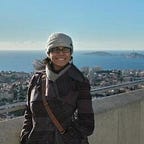Dr. Cristina Torres Duarte
Dr. Cristina Torres Duarte is a post-doctoral scholar at the University of California, Davis’ Bodega Marine Laboratory, where she currently studies nanoparticle pollution in marine environments.
I first met Dr. Cristina Torres Duarte in September 2016 after I had joined a team of scientists studying ocean acidification at UC Davis’ Bodega Marine Laboratory. I was helping her measure the pH of different seawater treatments for an experiment assessing the interactive effects of seawater pH and nanoparticles on the development of sea urchin larvae. This experiment considering two very different man-made impacts aptly demonstrates Cristina’s interdisciplinary approach to science.
Throughout her career, Cristina has sought creative ways to study and resolve environmental issues, as can be seen from her rich educational history — a Bachelor’s degree in chemical engineering as well as Master’s and Doctoral degrees in Biotechnology from Instituto de Biotecnología of Universidad Nacional Autónoma de México (UNAM). She describes biotechnology as a technique that employs tools found in nature to fix human-derived problems.
As an undergraduate student, Cristina’s initial perception of a scientific career was one filled with awards and acclaim — she aspired to be like Mario José Molina Pasquel Henriquez, the recipient of the Nobel Prize in Chemistry in 1982 from Cristina’s native country of Mexico. However, an opportunity to work with a female associate professor, Dr. Marcela Ayala, showed Cristina that a career in science was about striking a delicate balance: Dr. Ayala managed to have a family and a successful career while still achieving happiness.
Cristina experienced a high volume of cultural enrichment at UNAM with several students from different Latin American countries and multiple regions of Mexico. Although they all spoke Spanish, regional differences in their dialects initially made communication difficult. Instead of letting this become a barrier, Cristina and her colleagues used their diverse cultures and experiences to slowly develop their own multicultural dialect and long-lasting friendships.
When I contacted Cristina to be part of this series, she was uncomfortable being labeled a “minority”. Her parents always encouraged her to ignore anyone who treated her differently for the way she looked. Supportive parents coupled with her diverse cultural experiences from UNAM meant Cristina had never perceived herself to be a minority in science.
If anything, Cristina observed that education was a source of marginalization. For example, during an appointment with a hair stylist, a casual conversation quickly came to a halt when Cristina told the stylist she was getting her PhD. Conversely, she admits that she has also judged others based on their educational backgrounds: she was initially put off by her now-husband’s lack of a high school diploma, though his rich natural history knowledge and non-science perspective showed her that education comes in many forms. To further explicate her revelation, she roughly translated a Spanish adage, “It doesn’t matter if you have your PhD, you can still be ignorant — smart people don’t need a PhD.”
Nonetheless, Cristina recognizes that nationality and ethnicity can be sources of both implicit and explicit prejudice. Although Cristina deliberately chose to pursue post-doctoral research in the United States due to its close cultural ties to Mexico, she still braced herself for discrimination. She worried about being singularly categorized as a woman, a Mexican, or a scientist despite ascribing herself to all of those identities. Thus, she was happily surprised by the welcoming communities of the UC Davis Bodega Marine Laboratory and Sonoma County. She often describes this area as “a happy, healthy bubble”, but is afraid that might change soon.
Cristina’s first true experience as a minority was on November 8, 2016, when she began processing the extent of the anti-immigration, populist sentiments expressed during the recent election cycle. Beyond immigration issues, Cristina is worried about the direction the new administration might take U.S. science programs. At one point she wryly joked that she would have to return to Mexico because of reductions in science funding, not because she is Mexican.
Undeterred, Cristina strives to become a project scientist and foster the cultural diversity she experienced at UNAM by mentoring young scientists from multiple international institutions. Cristina reminds me that just as increased biodiversity benefits natural systems, diverse perspectives overwhelmingly improve both scientific exploration and the human experience.
